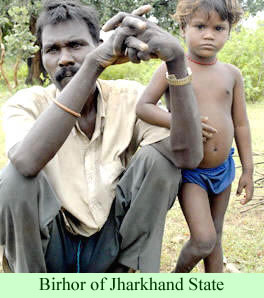When Ratni Birhor starved to death in her hut in September 2011, the story made headlines due to allegations of government neglect of the Birhor people. Last week, the Hindustan Times, a major English language daily newspaper in India, provided an update to the story.
An investigation in 2011 shortly after the woman died had concluded that she had not received government welfare rations for many months. The roof on her hut was leaking, her job card showed that she had not had any work, and she had not received any old-age pension support. The government had completely abandoned her.
Government officials in Jharkhand State, where her village, Tilra, is located, responded that reports in the media were incorrect—the woman had simply died of natural causes. She and her family had all received appropriate pension payments, they said. A subsequent investigation, however, pointed out that government agents had tried to circumvent the outcry by surreptitiously placing food grains in her hut in order to cover up the fact that she had, in fact, starved to death.
Abhishek Saha, a reporter for the Hindustan Times, visited Tilra a few weeks ago and found Ratni Birhor’s husband, Bhola Birhor, lying in his hut, paralyzed from a severe illness. He is 60. Saha writes that his condition reflects the Birhor as a whole: paralysis due to inattention. The cause, he suggests, is due to the fact that the former hunting and gathering people were forced to abandon that lifestyle and to settle into permanent communities. However, they have few skills with which to earn livelihoods and to adopt modern ways. They mostly subsist on welfare.
The journalist quotes Gopi Nath Ghosh, a human rights activist, who had led an investigation in Tilra of the passing of Ratni Birhor and had concluded that the her death “exposed the loopholes in the implementation of policies meant to benefit the vulnerable tribal groups.” He filed a complaint with an anti-corruption ombudsman agency in Jharkhand called the Lokayukta.
The Hindustan Times reports that the Lokayukta has recently acknowledged that government agencies had, indeed, fallen short in the implementation of policies that would benefit the Birhor in Tilra. It proposed the establishment of a committee to monitor the situation.
Saha was told by the Tilra Birhor that since Ratni’s death and the ensuing outcry, the supply of food grains and access to healthcare in the village has, in fact, been better. But they also pointed out that the houses built for them by the government had not really been kept up. Meena, a Birhor woman in the village, said, “many of the houses here do not have doors. We use clothes or tin sheets to cover the space provided for the door to shield ourselves from wind and rain.” Meena makes ropes for sale out of jute or used plastic bags.
Since new houses are not being built, older people in Tilra are moving out of their small block homes into what the journalist refers to as make-shift housing—essentially, temporary, decrepit shacks, in order to make room for younger family members in the more modern houses. The story in the Hindustan Times includes a couple pictures, one of which shows a shack for the older people and a more modern house near it. Government agents recently provided blankets for the villagers, but some of the Birhor asked how a family of ten could share one quilt.
Saha spoke with Ram Bopal Pandey, the development officer for the local block in which Tilra is located, about the situation. He replied that pensions are regularly paid to the villagers, and that blankets were distributed according to the sizes of families. He said he had not been notified by the Birhor that they had any problems with the doors on their huts.
